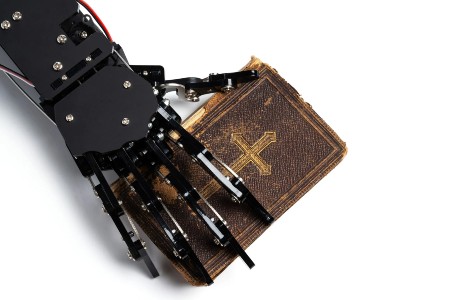Money expert advocates saving -- and giving away -- 10 percent
FREE Catholic Classes
McClatchy Newspapers (MCT) - Ellie Kay calls herself "America's Family Financial Expert" and has appeared on CNN, "Good Morning, America," CNBC's "Power Lunch" and other TV and radio shows.
Highlights
McClatchy Newspapers (www.mctdirect.com)
4/6/2009 (1 decade ago)
Published in Marriage & Family
She married a military pilot, had five children in seven years and still managed to pay off $40,000 in consumer debt in less than three years. She wants to help others in these hard economic times learn how to survive and thrive financially. She bases her financial philosophy on biblical principles but said people of any, or no, religious background will be successful following her plan.
The 46-year-old woman sat down on a recent weekend at a Christian book expo to talk with The Modesto Bee about finances and her most recent book, "Living Rich for Less: Create the Lifestyle You Want by Giving, Saving and Spending Smart" (Waterbrook, $16.99).
In the front of the book, even before the title page, she lists ways families earning less than $100,000 can save $30,000 this year. Some of the tips apply to any income level, including:
Don't overpay on your income tax withholding. For every $2,500 in taxes withheld, you lose up to $150 in interest equity.
Donate $800 of items to Goodwill. Save $224 on taxes.
Most consumers pay six late fees per year on a variety of bills at an average penalty of $30 each. Use tips in the book to pay on time and save $180.
Redeem just 25 percent of coupons in an entertainment discount book. Save $4,250 per year.
Layer savings on food shopping like the average family of four, which the USDA reports spends $7,968 per year, by combining store sales, coupons, double coupons, "cash off your next shopping trip" and in-store coupons. Save $3,900 per year.
Refinance a $200,000 home with an interest rate 1.5 percent lower than the existing mortgage and with minimal closing costs (assuming a 12-month period on recovery costs). Save $22,123 over the course of a 30-year loan, or $737 per year.
"My greatest ambition is to help Mr. and Ms. America live rich for less," Kay said.
Her bottom-line advice is the 10/10/80 rule: Give away 10 percent. Save 10 percent. Spend smart the other 80 percent.
"The practical truth is that smart spending will allow you to live in your own home when the ARMs start to rise and house prices drop. It means a recession-proof life when the economy is shaky and consumer confidence is low," she said in the book.
"It's a simple, straightforward strategy that works every time because if you spend wisely, you won't have debt, and that's the crux of spending smart."
Kay said she is a born saver who married a born spender. The financial plan the Kays came up with is one that both can live with. She warns against saving more than 10 percent, as savers would like to do. She also warns against spending more than you earn, as spenders often do. And she said it's important not to get so focused on paying off debt that you don't leave money in the spending plan _ her pet name for the dreaded word "budget" _ for family fun or entertainment.
She's especially passionate about the 10 percent to be donated to nonprofit groups _ whether a church, a homeless shelter or other organizations in your community or around the world.
Kay learned the joy of giving at an early age. When she was 7, she started her first business _ charging other schoolkids money to shake her hand that held an electric buzzer. For "Ellie's Electrifying Handshakes," she charged girls a dime and boys 15 cents. (She said she charged boys more to alleviate the "cootie" factor.)
'HOOKED ON GIVING'
In two weeks, she had made $10. Her mom said she had to give $1 of it to church. She wasn't happy about giving away her hard-earned money, but that week, her Sunday school class was giving the offering to an organization that helped feed children in Africa. When she dropped in her dollar bill, Kay said, she got "hooked on giving. I would give away dolls, I would give away food. It drove my parents a little crazy."
The practice continued, even when finances were tight when the Kays first married.
"Even though we barely had enough money in those first few years to buy groceries, we still gave 10 percent," she said.
As a result: "We never went hungry. Our finances were not ever forsaken. We got out of debt. Our kids all will graduate from college debt-free. And we never regretted a dollar given."
PAYING OFF DEBT
"The average American family makes $50,000 a year," Kay said. "However, the average family spends $55,000 a year, so it's not what you're making, it's what you're spending."
What is the No. 1 mistake that most families make today?
"They don't have a spending plan," Kay said. "They know they should have some kind of a plan for their money, but they don't. They're spending their money anyway, so why not plan where it goes?
"If they do get a spending plan and they don't stick to it, it's because it's so rigid, they can't do it. Families eliminate their fun factor, their entertainment, and that's a mistake. Yes, it's important to pay off debt, but I think it's also important to still have fun as a family. It's kind of like going on a totally liquid diet. How long is that going to last? Yet people do that with their budget and set themselves up for failure."
Then there's what Kay calls the Cha Ching Factor _ things that take little or no time or money, yet yield big returns.
Here's one example: Call your insurance agent or other home insurance companies each year to find cheaper rates.
"You can take 10 minutes to check on homeowners insurance, which most people don't do because they pay it through their monthly mortgage payment. It takes 10 minutes and you can save 30 percent."
BREAKING FREE OF FEAR
Kay understands today's economic woes.
"Coming from our experience we went through 22 years ago _ having $40,000 in consumer debt and not knowing some weeks if we'd have enough for groceries, I know what it's like to fear. But I also know what it's like to live with the creator of the universe who has dominion over fear. So one of the messages I'm talking about is the fact that when you get your finances in proper order, then your fears will go away.
"Here's the cool thing: God's plans work out, whether you're a believer or you're not a believer. So if you're not a believer, and you're spending less than you make, and you're minimizing debt, and you're giving out in the community, these are going to work. A lot of God's principles work, whether you're a believer or not. So I believe the principles in this book are really an answer to the fear that we see in the economy. And, I think it provides hope."
For more about Ellie Kay, visit www.elliekay.com.
___
© 2009, The Modesto Bee (Modesto, Calif.).
Join the Movement
When you sign up below, you don't just join an email list - you're joining an entire movement for Free world class Catholic education.
-

-
Mysteries of the Rosary
-
St. Faustina Kowalska
-
Litany of the Blessed Virgin Mary
-
Saint of the Day for Wednesday, Oct 4th, 2023
-
Popular Saints
-
St. Francis of Assisi
-
Bible
-
Female / Women Saints
-
7 Morning Prayers you need to get your day started with God
-
Litany of the Blessed Virgin Mary
Bound by Betrayal: Katie's Struggle with Lust, Lies, and Redemption
-

John: A Story of Addiction, Hopelessness, and the Search for Redemption
-

Science vs. Faith: The Battle for Truth and Hope
-
Regenerative Agriculture: The Answer to America's Chemical-Laden Food Crisis
-
Prestige vs. Purpose: Where Should Your Donations Really Go?
Daily Catholic
 Daily Readings for Wednesday, January 08, 2025
Daily Readings for Wednesday, January 08, 2025 St. Thorfinn: Saint of the Day for Wednesday, January 08, 2025
St. Thorfinn: Saint of the Day for Wednesday, January 08, 2025 Prayer for a Blessing on the New Year: Prayer of the Day for Tuesday, December 31, 2024
Prayer for a Blessing on the New Year: Prayer of the Day for Tuesday, December 31, 2024- Daily Readings for Tuesday, January 07, 2025
- St. Raymond of Pennafort: Saint of the Day for Tuesday, January 07, 2025
- St. Theresa of the Child Jesus: Prayer of the Day for Monday, December 30, 2024
![]()
Copyright 2024 Catholic Online. All materials contained on this site, whether written, audible or visual are the exclusive property of Catholic Online and are protected under U.S. and International copyright laws, © Copyright 2024 Catholic Online. Any unauthorized use, without prior written consent of Catholic Online is strictly forbidden and prohibited.
Catholic Online is a Project of Your Catholic Voice Foundation, a Not-for-Profit Corporation. Your Catholic Voice Foundation has been granted a recognition of tax exemption under Section 501(c)(3) of the Internal Revenue Code. Federal Tax Identification Number: 81-0596847. Your gift is tax-deductible as allowed by law.







 Daily Readings for Wednesday, January 08, 2025
Daily Readings for Wednesday, January 08, 2025 St. Thorfinn: Saint of the Day for Wednesday, January 08, 2025
St. Thorfinn: Saint of the Day for Wednesday, January 08, 2025 Prayer for a Blessing on the New Year: Prayer of the Day for Tuesday, December 31, 2024
Prayer for a Blessing on the New Year: Prayer of the Day for Tuesday, December 31, 2024


